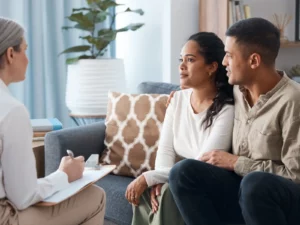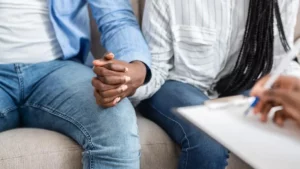Marriage is a captivating and complex journey that requires effort, compromise, and open communication from both partners. However, there are times when conflicts arise, trust is shaken, and couples find themselves in need of professional help to mend their relationship. In this article, we will explore the reasons behind a husband’s resistance to marriage counseling & why husband refuses marriage counseling and provide insights and strategies for addressing this issue effectively.
Contents
What Are The Importance Of Marriage Counseling?
 Marriage counseling plays a crucial role in helping couples navigate through challenges and improve their relationship. It is a form of therapy that focuses specifically on the issues and dynamics within a marriage or committed partnership.
Marriage counseling plays a crucial role in helping couples navigate through challenges and improve their relationship. It is a form of therapy that focuses specifically on the issues and dynamics within a marriage or committed partnership.
Here you can check some of the vital points:
- Communication: Effective communication is the foundation of a healthy relationship. Marriage counseling helps couples enhance their communication skills, teaching them how to express their needs, listen attentively, and resolve conflicts constructively.
- Conflict resolution: Conflicts are a natural part of any relationship, but when not resolved properly, they can create distance and resentment. Marriage counseling equips couples with valuable tools and techniques to manage and resolve conflicts in a healthy manner.
- Managing life transitions: Life transitions, such as the birth of a child, career changes, or loss of a loved one, can place strain on a marriage. Marriage counseling offers support during these transitions by helping couples navigate the challenges and changes they face.
- Emotional support: Marriage counseling provides a non-judgmental and confidential space for couples to express their emotions and vulnerabilities. It allows individuals to feel heard, validated, and supported, reducing feelings of isolation and frustration.
In summary, marriage counseling is valuable because it facilitates open communication, teaches conflict resolution skills, enhances intimacy, assists with life transitions, strengthens commitment, provides emotional support, and serves as a preventive measure.
Understand The Reasons For Husband’s Refusal
 There can be various reasons why husband refuses marriage counseling. It’s important to note that individual circumstances and dynamics can greatly influence a person’s decision.
There can be various reasons why husband refuses marriage counseling. It’s important to note that individual circumstances and dynamics can greatly influence a person’s decision.
Here are some potential reasons for a husband’s refusal:
- Lack of awareness or understanding: The husband may not fully comprehend the benefits and purpose of marriage counseling. They might not realize that it can provide a supportive environment for addressing concerns, improving communication, and strengthening the relationship.
- Stigma or pride: Some individuals perceive seeking help or therapy as a sign of weakness or failure. A husband may be hesitant to participate in marriage counseling due to concerns about societal judgment or a desire to maintain a strong and independent image.
- Fear of blame or confrontation: The thought of discussing problems and conflicts openly can be daunting for some individuals. A husband may fear that marriage counseling could result in blame or criticism, leading to increased tension or conflict within the relationship.
- Doubts about effectiveness: A husband might have reservations about whether marriage counseling will actually be beneficial. They may have heard negative experiences or have skepticism regarding the potential outcomes, which can lead to their reluctance to engage in the process.
- Feeling overwhelmed or hopeless: If the husband perceives the relationship problems as insurmountable or believes that counseling won’t make a difference, they may resist participating. They may feel overwhelmed by the challenges or have a sense of hopelessness about the possibility of positive change.
It’s important to approach the topic of marriage counseling with empathy and open communication. Understanding the specific reasons behind a husband’s refusal can help address their concerns, provide reassurance, and potentially find alternative solutions that both partners are comfortable with.
Approaches To Overcome Husband’s Resistance
When faced with a husband’s resistance to marriage counseling, there are several approaches that can be helpful in overcoming their reluctance. Here are some strategies to consider:
Open & non-confrontational communication
Start by having an open and honest conversation with your husband about your concerns regarding the relationship. Express your desire for growth and improvement, emphasizing that counseling can be a valuable resource for both of you. Use a non-blaming and non-confrontational tone to create a safe space for dialogue.
Highlight the benefits
Clearly communicate the potential benefits of marriage counseling, such as improved communication, increased intimacy, and a stronger, more fulfilling relationship. Discuss specific issues that can be addressed through counseling and how it can provide a supportive environment for finding solutions.
Provide your husband with information about marriage counseling, including how it works, what to expect, and success stories from couples who have benefited from it. Share articles, books, or videos that highlight the positive outcomes of counseling to help alleviate any misconceptions or concerns he may have.
Address specific concerns
 Take the time to understand and address your husband’s specific concerns about marriage counseling. Listen attentively and validate his feelings. If he has reservations about the process or doubts its effectiveness, discuss these concerns openly and offer reassurance. You can suggest attending an initial session together to get a better understanding of how counseling can benefit your relationship.
Take the time to understand and address your husband’s specific concerns about marriage counseling. Listen attentively and validate his feelings. If he has reservations about the process or doubts its effectiveness, discuss these concerns openly and offer reassurance. You can suggest attending an initial session together to get a better understanding of how counseling can benefit your relationship.
Consider alternative approaches
If your husband remains unwilling to attend traditional marriage counseling, explore alternative approaches that might be more appealing to him. This could include online counseling, couples workshops or retreats, self-help resources, or seeking guidance from religious or spiritual leaders if applicable.
Patience and timing
Recognize that change takes time and that your husband may need space to process his reservations. Avoid pressuring or forcing him into counseling. Instead, focus on maintaining open lines of communication, reinforcing your desire for a healthier relationship, and revisiting the topic periodically in a respectful manner.
Things To Consider While Choosing The Right Counselor
 When choosing the right counselor, there are several important factors to consider. Here are some key considerations:
When choosing the right counselor, there are several important factors to consider. Here are some key considerations:
- Qualifications and expertise: Look for a counselor who is qualified and licensed in their respective field. Consider their education, training, and experience in providing couples counseling. Specializations or certifications in marriage and family therapy can be advantageous.
- Approach and orientation: Different therapists may have varying therapeutic approaches or orientations. Research and consider which approach aligns with your preferences and goals as a couple. Common approaches include cognitive-behavioral therapy (CBT), emotionally focused therapy (EFT), or solution-focused therapy.
- Experience with couples: Ensure that the therapist has experience specifically working with couples. Couples therapy requires unique skills and dynamics compared to individual therapy. A therapist with expertise in couples counseling will be better equipped to address relationship issues effectively.
- Cost and insurance coverage: Evaluate the cost of therapy and inquire about insurance coverage or sliding scale fees if affordability is a concern. Consider the value you place on the quality of therapy and balance it with your budget.
- Recommendations and reviews: Seek recommendations from trusted sources, such as friends, family, or healthcare professionals. Online reviews or testimonials can also provide insights into the therapist’s reputation and effectiveness.
- Collaboration and teamwork: A good therapist should foster collaboration and teamwork between partners. They should facilitate open communication, promote equality, and help you work together towards common goals.
Remember that finding the right therapist may involve some trial and error. It is perfectly acceptable to have initial sessions with different therapists to assess compatibility before committing to ongoing therapy.
The Success Rate Of Marriage Counseling
 Couple counseling has demonstrated an effectiveness of around 70%-80 in improving relationships and addressing various issues. Research consistently indicates positive outcomes for couples who engage in counseling. Along with improvements in relationship satisfaction, communication, and conflict-resolution skills. Studies show that therapy can lead to lasting positive changes.
Couple counseling has demonstrated an effectiveness of around 70%-80 in improving relationships and addressing various issues. Research consistently indicates positive outcomes for couples who engage in counseling. Along with improvements in relationship satisfaction, communication, and conflict-resolution skills. Studies show that therapy can lead to lasting positive changes.
However, the effectiveness of couple counseling is influenced by factors such as the commitment and motivation of both partners, the skill and experience of the therapist, and the specific issues being addressed. It is important for couples to actively participate, be open to feedback, and practice the skills learned during counseling for the best outcomes.
Conclusion
Facing challenges in a marriage can be overwhelming, especially when your spouse initially refuses to engage in marriage counseling. However, with patience, understanding, and effective communication, it is possible to encourage your husband’s participation and embark on a journey of healing and growth together. By addressing the root causes of resistance, choosing the right therapist, and highlighting the benefits of counseling, you can rebuild trust, improve communication, and strengthen your relationship.
Marriage is a beautiful journey, However, every marriage encounters challenges. If you have any queries regarding Online Marriage Counseling experienced therapists at CoupleMantra can help: Book a trial couple therapy session.


